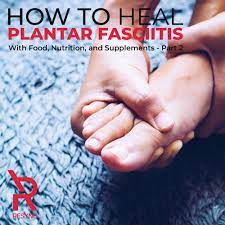General Health Tips & News
Supplements that can help in managing Plantar Fasciitis
By A.S. (staff writer) , published on November 25, 2021

Medicine Telehealth Health Supplements for Plantar Fasciitis
Plantar fasciitis (PF) is a common foot problem in adults. The plantar (heel) and fascia (connective tissue) is a broad band of fibrous tissue that connects the toes to the heel. When this tissue is torn, overused, or improperly stretched it can become inflamed (fasciitis).
So, basically, PF is an inflammatory process in which the tendon running from the heel to toe degenerates. You suffer from stabbing pain in which your heel as you take a couple of steps in the morning. Runners, obese females over 40 years of age, and athletes are more prone to suffer from plantar fasciitis.
Signs and Symptoms
The patient complains about the heel pain that is at its peak after prolonged rest. It may resolve after minor activity but may worsen after strenuous exercise.
Tenderness, pain, and soreness in the heel area are the most common symptoms.
Supplements for Plantar Fasciitis
Regardless of all the surgeries and medications that are available to treat plantar fasciitis, supplements are a better alternative as they eliminate the chance of side effects and provide a safer treatment. Some of the most recommended plantar fasciitis supplements are
1. Vitamin C
Vitamin C acts as an anti-inflammatory agent that directly acts on plantar fasciitis inflammatory mediators, thus preventing further deterioration of the condition. A case report suggests that a lady, 44 years of age, was supplemented with 1-3 grams of Vitamin C per day along with physiotherapy and showed recovery in 6 weeks.
2. Magnesium
Foods such as spinach, pumpkin, brown rice, etc. have a high content of magnesium in them which not only has anti-inflammatory properties but also aid in increased absorption of calcium. C-reactive protein indicates the level of inflammation in the body and studies suggest that magnesium significantly reduces its level, thus preventing plantar fasciitis.
3. Fish Oil
Fish oil supplements have a high content of omega-3 fatty acids, which have anti-inflammatory and anti-oxidative properties. According to research, the effect of omega-3 fatty acids found in fish oil is similar to that of ibuprofen in terms of relieving pain.
4. Curcumin
Curcumin is the major element found in turmeric that reduces pain, redness, and swelling on the heel. It has long been utilized in traditional medicine because of its capabilities to reduce inflammation, thus allowing the ligaments to strengthen and rejuvenate.
5. Calcium
Calcium does not treat plantar fasciitis but prevents complications like heel spur, which may develop after a ligament injury. Experiments provide the efficacy of calcium in cushioning the heel and reducing pain.
6. Arnica
Helenalin is the key component of Arnica, used widely to treat muscle strain, heel pain, and to reduce swelling and bruising. It reduces inflammatory triggers, which subsequently reduces swelling and tenderness. Arnica also dilates capillaries, drawing increased blood flow into the treated area. Arnica should not be taken internally. It can be applied topically in the form of a cream, lotion, or tincture to the sole of the foot to reduce the inflammation associated with heel pain and Plantar Fasciitis.
7. Bromelain
Bromelain is abundantly found in pineapples. It has anti-inflammatory properties. Moreover, it accelerates the healing process. It also aids in digestion and nutrient absorption. Bromelain is a mixture of protein-digesting enzymes or proteolytic enzymes. Recent studies suggested that bromelain be as effective as ibuprofen and aspirin in reducing the pain and inflammation associated with Plantar Fasciitis. In fact, some surgeons are now recommending that patients take bromelain supplements in the weeks prior to surgery due to its ability to accelerate healing and reduce bruising and swelling.
8. Ginger
Ginger has strong pain-relieving properties and is as effective as NSAIDs in treating pain caused by plantar fasciitis. It has anti-inflammatory and anti-oxidative properties which provide significant benefits.
The Takeaway
The plantar fasciitis supplements that are mentioned above are supported by the studies in terms of treating and preventing symptoms of plantar fasciitis. They have been a part of traditional medicines and are widely used now.
References
Furman, David, et al. “Chronic Inflammation in the Etiology of Disease across the Life Span.” Nature Medicine, vol. 25, no. 12, Dec. 2019, pp. 1822–32. PubMed Central, doi:10.1038/s41591-019-0675-0.
García-Coronado, Juan Mario, et al. “Effect of Collagen Supplementation on Osteoarthritis Symptoms: A Meta-Analysis of Randomized Placebo-Controlled Trials.” International Orthopaedics, vol. 43, no. 3, Mar. 2019, pp. 531–38. Springer Link, doi:10.1007/s00264-018-4211-5.
Hall KD, et al. Ultra-Processed Diets Cause Excess Calorie Intake and Weight Gain: An Inpatient Randomized Controlled Trial of Ad Libitum Food Intake. Cell Metab. 2019 Jul 2;30(1):67-77.e3. doi: 10.1016/j.cmet.2019.05.008. Epub 2019 May 16. Erratum in: Cell Metab. 2019 Jul 2;30(1):226. Erratum in: Cell Metab. 2020 Oct 6;32(4):690. PMID: 31105044.
Jafri, M Saleet. “Mechanisms of Myofascial Pain.” International scholarly research notices vol. 2014 (2014): 523924. doi:10.1155/2014/523924
Find articles related to: Medicine Telehealth Health Supplements for Plantar Fasciitis
More articles about General Health Tips & News
Back to the Health Tips Index




